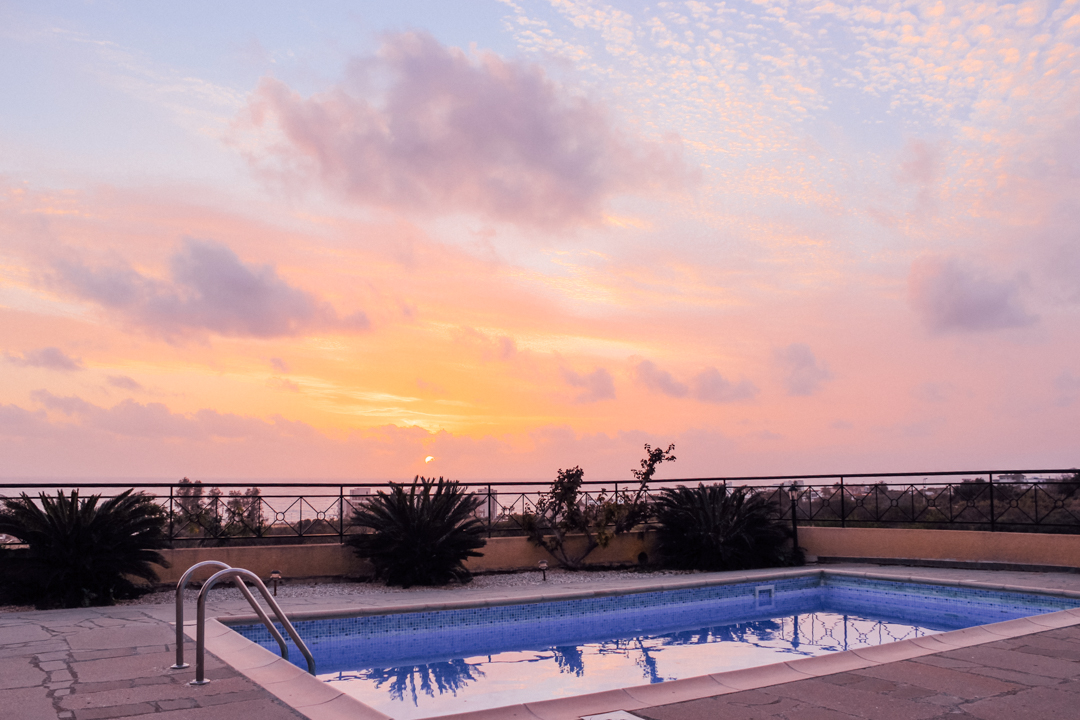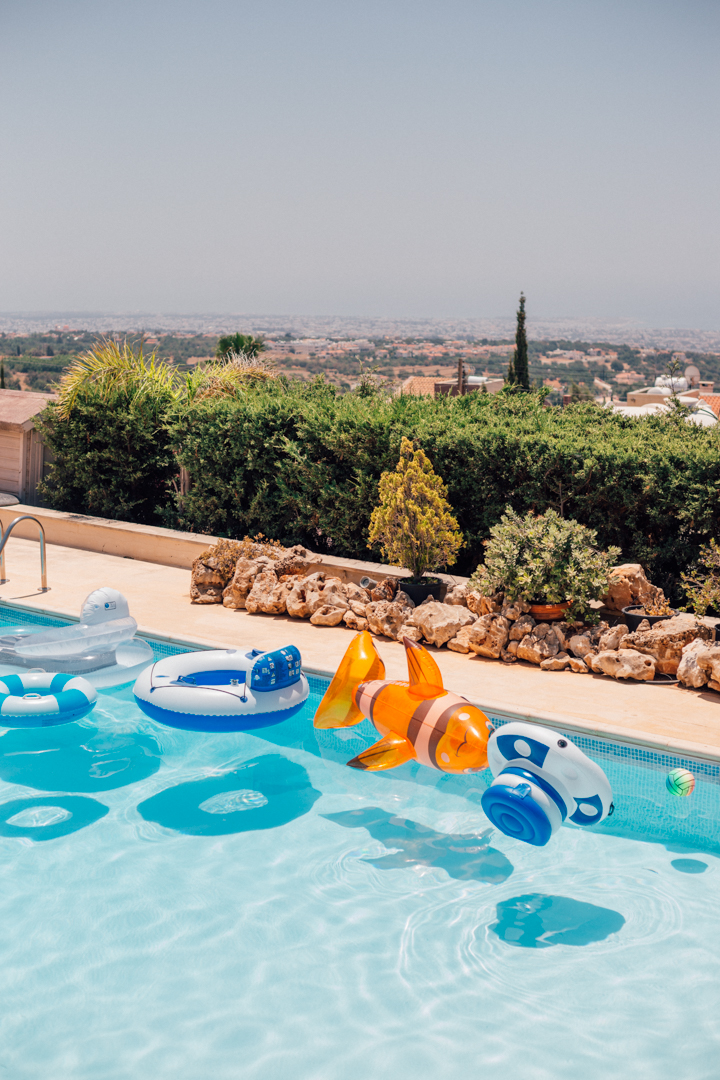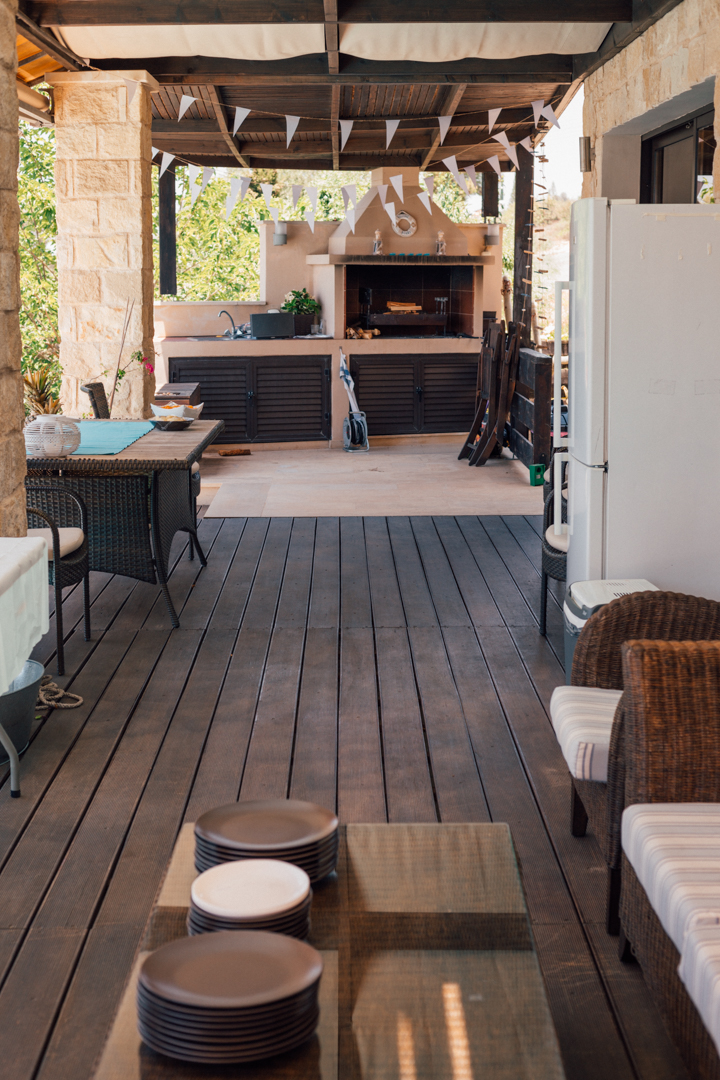I know this is going to sound hilarious, but in my six years in Cyprus I have lived in total of 5 different properties. Each one had its own twist and story to tell and was a steep learning curve.
If you’re planning to move to Cyprus, the most important piece of advice I can give you is to know your priorities.
By that I mean know what’s most important for you – easy access to workplace, short commute, decent living space that doesn’t make you depressed, living in a lower quality accommodation but closer to the beach, living walking distance to a shop/restaurant or having to drive everywhere and so on.
I will shed a bit of light on my personal experience, if you want to skip straight to the practical advice head right to the point number one instead of listening to this account of encounters with properties in Cyprus.
I moved to Cyprus in 2013 with then my boyfriend, now husband. We both moved from London living in a tiny place that can only be described as a living hell on Earth (and that’s being kind). From there we moved to a gorgeous 3 bedroom villa in Kissonerga, that cost half of our rent in London and had 180C panoramic sea views.
What we didn’t know back then is that most houses have no kind of heating for the winter so we ended up using airconditioning to heat up a large open space living area which ended up costing us around 400 eur for 2 months period in winter.
The house itself was an absolute dream. Small garden, gorgeous decent size pool, breathtaking views and a large first floor terrace. We even got some resident lizards moving in that we were feeding regularly, had outdoor BBQ spot (where we hilariously tried to grill a whole turkey one Christmas) and a parking spot for the car.

We could watch a gorgeous sunset straight from our kitchen cooking food, the kitchen was large enough to do dance lessons there and the landlord was a super friendly and always happy to help local doctor.
All of that was very quickly forgotten when my son was born in January 2015 and the walls covered with mold (bottom to roof) convinced me it may not be the healthiest place to keep a newborn. Unfortunately instead of trying to negotiate with the landlord and getting heating installed, we decided to move out (which we later agreed was a mistake because the landlord happily installed gas heating for new tenants, and raised the rent).
Moving to 2016, we are now living in Tala.
We didn’t really think it through because we were too taken by the gorgeous house with stunning views (at a price we could barely afford) so we ended up taking the place. Not only it was hugely impractical (20 mins drive to town) but also not very child friendly (no fence on a huge terrace with a direct drop to the pool). It had one thing we missed in the previous house – heating and a fireplace, which was one of our requirements.
We ended up moving out of there after a year because it was simply too expensive and too impractical to live there. As a farewell gift, the local municipality slapped us with 600 eur water bill (for automated watering system set up by the gardener) and a scratched car from the gardener moving branches out of the yard.

We found a gorgeous bungalow house at the edge of the city (Konia), walking distance to a shop and local taverna and a short drive to the city. It was set up to be super efficient with low bills and owned by lovely English couple.
Just two months after we settled in, we were told that the house was sold out and that we have to move out. We spent 3 months in the house before calling the same moving guys who were having a really good laugh when we told them what happened.

From there we moved to Coral Bay area, to the probably biggest house we lived in. It had 4 bedrooms, massive yard and really good price. It was walking distance to a big supermarket, nursery and the Coral Bay high street. Maximum convenience at the price we could afford.
We would have probably stayed there until we left the country if it wasn’t for the issues with our water bills (yet again!).
There was water leaking from the ground in the drive in area which was coming from a water pipe burried there. The repair men came in, cut the plastic pipe and instead of fixing in properly, the connected it above ground and led it straight through our drive way, meaning we were driving over it each time with our car.
After two months, our water bills amounted to over 1.500 eur and the landlord ignored all letters and text messages looking for resolution. The landlord worked at the local town hall so could have settled the whole issue by a visit to the next door office.

Instead of that, she sent us an eviction notice giving us 30 days to move out of the property. In addition to that, she changed the locks on the house before we were able to collect remaining belongings (we moved to our new house earlier before the old rent expired). So our brand new bed frame, mattress, carpets and some small furniture is there for her new tenants to enjoy.
That was the last drop I needed to conclude that me and Cyprus are officially divorcing and I”m so done with renting.
We moved to our final house close to the beach in Coral Bay, which was a brand new ‘luxury’ build, that had cracks in the walls a few months after we moved in and water leaking in from the balcony.
The location and convenience proved one of the biggest benefits of the house and the fact that it had a small living space turned out to be a lot less costly to keep cool or warm as the seasons changed.
So that’s the brief history of my rental experience in Cyprus. As you can tell, what sort of experience you will have really depends on the landlord and the condition of the property. Arm yourself with a lot of patience and be prepared for the unexpected.
Here is some practical advice you should consider before renting long term in Cyprus.

1. No Heating in Winter
Most properties in Cyprus do not have a heating for winter months. I’ve been told that the winter is too short to be bothered by it. Well I beg to disagree.
Usually if you have a large open space living area you will struggle a lot more than in a smaller house with smaller rooms. Using airconditioning to heat up a large space is like trying to use hairdryer to keep you warm. It’s expensive and not exactly effective.
If you have to get a house without heating, purchase electric blankets before your first winter to keep in your living room and bed.
Houses that do have heating, are usually in the higher price brackets (especially central heating) or have at least a fireplace. Gas and wood is generally fairly cheap.
2. Prepare for Deposits
Every time we moved we had to go through the same process of retreiving deposits and paying new deposits to the municipality (even within the same town).
This is especially true about electricity (deposit of 200 eur each time) and water (usually around 150 eur). Nobody mentions it but you have to be prepared for it.
3. Bills in Your Name
It’s very rare that the landlord will let you keep the electricity or water bills in their name. You always have to make the transition to your name and normally a rental contract is enough to make the change.
For electricity change, the landlord has to come there with you to get it changed.
Both water bills and electricity bills are paid every two months. Water bills come to your address and electricity bills can be arranged to be delivered by email.
Electricity can be paid online but water bills have to be paid in person in the town hall offices.
There is also an annual refuse collection / local tax that’s payable once a year. Usually it’s around 200 eur and you have until the end of the year to pay it.
4. Contracts in English
All of our rental contracts were drafted in English and it’s perfectly acceptable. The normal term is for 12 months with a clause that it’s automatically extended unless you or the landlord give notice of intention to leave.
5. Landlord’s Duties
Make sure that the landlord’s duties are expressly stated in the contract – specifically what type of repairs should they pay for and what type of repairs are your responsibility.
If you’re dealing with a difficult landlord, it will save you a lot of time disputing it if it’s expressly stated in the contract.
6. Deposit Return
Normally the rental contract would come with one month rent as a deposit (hold by the landlord or the agency) and one month rent in advance.
Make sure that there is a specific deadline in which the deposit should be returned by the landlord. The phrase ‘will be returned upon inspection of the property’ is too vague and not accurate. Ask to add ‘within maximum of 30 days’ to make sure there is a deadline for the landlord.
7. Agency Fees
The agency fees are always paid by the landlord. I only later found out that it’s not a common practice and in some countries like Spain, the tenant has to pay the agency fees which amount to 50-100% of the monthly rent.
8. Finding the Best Place
In my experience, most of the property rental websites are completely inaccurate and out of date. Your best chance for finding a place quickly is to contact the agency directly and ask for listings that match your requirements.
Other option is Facebook groups (like ‘Long term rental Paphos’) where fresh listings are added daily and you’re guaranteed you’re not wasting your time with a house that’s been already taken.
9. Pools vs No Pool
We’ve always lived in a house with a pool and find it extremely beneficial in the summer. It’s just a super convenient way to cool off without having to walk to the beach and you’ve got the whole pool for yourself.
Normally villas without pool will be a lot cheaper than those that have one. Even a property with a pool is not exactly a win – we’ve seen so many of them that have 3 other apartment blocks pointing directly to the pool area, so not exactly a private way to enjoy your yard.
If you live in a city like Limassol or Nicosia, finding a decent size house that’s close to the central and has a pool is fairly difficult.
10. Warning Signs to Watch out For
From the years of accumulated experience, I would say these are the things that you need to pay attention to and may be an early warning sign:
- landlord that’s not overly interested in talking to you
- pool that looks like it hasn’t been cleaned for a long time
- any contract clause that requires you to pay for a gardener or pool cleaner without option to do the work yourself
- old air conditioning systems that are not efficient enough to run and will cost you a lot of money
- any signs of mold (if you’re checking in winter)
- cracks in the walls inside (easier for mold to get in if when it rains)
- old smells that make you fee like the house hasn’t been ventilated or cleaned in long time
- real estate agent that’s too keen to tell you how amazing the house is
- landlord / agent being very vague why the previous tenant left
- landlord / agent asking you to sign a contract without being able to read it properly and request any changes you might want
- landlord that doesn’t speak a word of English and can only communicate via agent, yet they don’t want to pay the agent to deal with the tenants
- houses close to banana plantations or other farming land (lots of crawlies making their way to your yard, most people do not mind but do consider – could be snakes, spiders, lizards etc)
If there is anything specific you’re interested in regarding renting in Cyprus, leave a comment here and I will try my best to answer!

Hi Lucia,
this is super helpful. Can I ask why you didn’t want your son to go to school in Cyprus? We’re considering a move with children so want to get as much info as possible.
Hi Katerina
I did not want him to go to a public school there and didn’t want to pay for private schools. Our long term plan was to relocate to Spain, so the school start just gave us good timing for doing that. You can research more on school options in some of the Facebook groups for expats in Cyprus, they are quite helpful. One of them is mums and dads in Cyprus, run by expats and they can recommend specific schools etc.
Good luck!
Lucia
Hello Lucia,
The information you have shared on this blog is simply great. Thanks a lot.
I have 1 question and would like to know if you can answer it. Is it easy to rent a flat for 1 year just with a EU passport? Since they ask for a lease/rental to get the yellow slip MEU1, I was wondering if this may be a a potential vicious circle.
Have a lovely day!
Thank you.
Hi Julio, we got our first rental villa without yellow slip. Only found out about it months after living there. Most agencies will ask for a passport and deposit & first rent in cash that’s all. It’s been a while since I rented though, so things might have changed. There is a facebook group for expats in cyprus, they will have more up to date information. Lucia